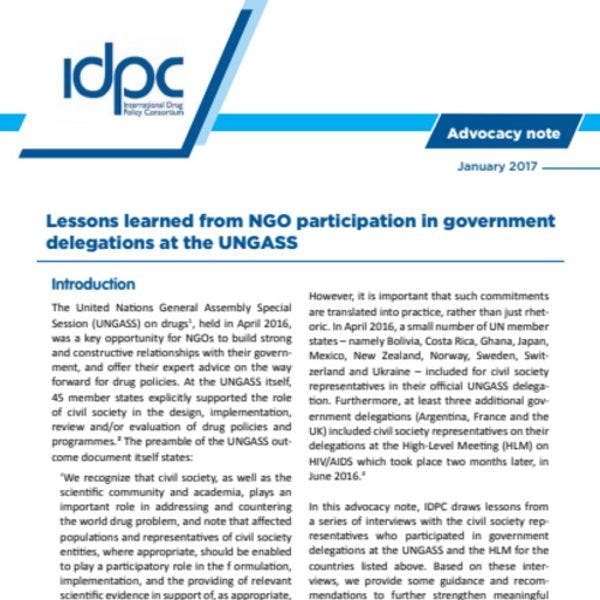Lessons learned from NGO participation in government delegations at the UNGASS
The United Nations General Assembly Special Session (UNGASS) on drugs, held in April 2016, was a key opportunity for NGOs to build strong and constructive relationships with their government, and offer their expert advice on the way forward for drug policies. At the UNGASS itself, 45 member states explicitly supported the role of civil society in the design, implementation, review and/or evaluation of drug policies and programmes. The preamble of the UNGASS outcome document itself states:
We recognize that civil society, as well as the scientific community and academia, plays an important role in addressing and countering the world drug problem, and note that affected populations and representatives of civil society entities, where appropriate, should be enabled to play a participatory role in the formulation, implementation, and the providing of relevant scientific evidence in support of, as appropriate, the evaluation of drug control policies and programmes…
However, it is important that such commitments are translated into practice, rather than just rhetoric. In April 2016, a small number of UN member states – namely Bolivia, Costa Rica, Ghana, Japan, Mexico, New Zealand, Norway, Sweden, Switzerland and Ukraine – included for civil society representatives in their official UNGASS delegation. Furthermore, at least three additional government delegations (Argentina, France and the UK) included civil society representatives on their delegations at the High-Level Meeting (HLM) on HIV/AIDS which took place two months later, in June 2016.
In this advocacy note, IDPC draws lessons from a series of interviews with the civil society representatives who participated in government delegations at the UNGASS and the HLM for the countries listed above. Based on these interviews, we provide some guidance and recommendations to further strengthen meaningful NGO participation in global drug control debates.
Keep up-to-date with drug policy developments by subscribing to the IDPC Monthly Alert.
Regions
Related Profiles
- International Drug Policy Consortium (IDPC)
